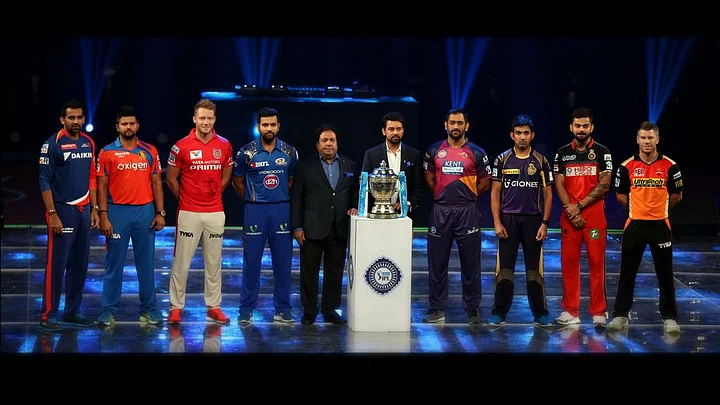It is that time of the year when an already cricket-frenzy India becomes more frenetic. Yes, it is IPL time. We can safely say that the Indian Premier League has transformed the game of cricket. Two years ago, rockstar Mick Jagger tweeted this:
It was shocking that Mick Jagger was watching IPL finals and tweeting about it. Well, if you look at Jagger’s Twitter account, he does not tweet excessively at all. Till date, he has tweeted only 788 times. This makes his IPL tweet even more significant. He cared to tweet about IPL final, seems like he was much excited.
Similarly, in 2016, Tottenham Hotspur’s striker and now English Football team’s captain Harry Kane congratulated RCB and Virat Kohli after their one specific victory in IPL 2016. He tweeted:
IPL Wins International Acclaim
It was surprising that Harry Kane, an internationally-known footballer, cared to tweet about a relatively lesser-known cricket league, ie IPL, and Virat Kohli. Kohli and the IPL may be undoubtedly well-known in India and abroad, but how many foreigners watch our Indian sporting events? How many people in the US or UK and beyond, actually even know the names of our players – famous or not?
If international icons like Mick Jagger and Harry Kane are actually watching the IPL (and Indian cricket), it definitely means something. Is the Indian Premier League turning out to be India’s soft power?
But first, what is soft power? It was coined by American political scientist Joseph Nye in his 1990 book ‘Bound to Lead: The Changing Nature of American Power’. In simple words, it is the influence of the country around the world without its overt show of power. Military and economic strength come under hard power, for example. Soft power can be subtly used to exert the influence of the host country over the world. So how this apply to the sports leagues?
When it comes to domestic sports leagues, Barclays Premier League is hugely popular all over the world. BPL or EPL is surely one of the most important soft powers of the UK. Research on the impact of British organisations and brands across the world has found that the premier league draws people to feel positively about the UK more than any other institution in the UK[1].
BPL is UK’s Biggest Soft Power
E&Y carried out a study regarding the economic impact of the premier league in the UK. The study came out with a startling revelation – in the 2013-14 season alone, the premier league contributed 2.4 billion euros to the Exchequer. It generated over 100,000 jobs, contributed 3.4 billion euros to the English GDP and collected up to 722 million euros from international broadcasting revenues[2].
So, BPL is indeed the most important soft power for the UK. All these statistics reveal that a sports league can have a very longstanding and overarching impact on the country, people and ultimately on World.
How can we replicate this in terms of the IPL? The IPL has many challenges; it is still in the nascent stage, when compared to other dominant leagues in the world. (NFL, MLB, NBA in USA, BPL, La Liga, Bundesliga in Europe). So as to match the level of those leagues in the world, the IPL needs to scale rapidly. One of the most important factors here is the number of teams and the format of the competition.
Tweaks Needed in Current IPL Format
IPL has as of now eight teams, but the number of teams must increase. So, to increase its reach and efficiency, the IPL must represent more and more cities in India and the count should go to maximum 14+ teams (this can cover the whole of India). The format of the competition is franchise-based, which, unlike promotion and the relegation format, doesn’t focus much on building youth teams and capabilities.
There must be tweaks in the current franchise format to accommodate changes such as youth teams.
With more teams, more young players, even from other countries, will get a chance to play in the IPL, and this can further generate jobs for more coaches, physiotherapists, scouts etc. It is important to note that European football leagues such as Barclays , and La Liga, are the reason football’s popularity keeps on soaring in countries such as India, where the national team doesn’t perform spectacularly.
IPL’s Future Potential
So, similarly with IPL, the BCCI can popularise the game of cricket where it is sparsely popular. With a greater number of teams, the IPL can give a chance to young players from countries such as Ireland, Afghanistan, Zimbabwe and even countries like Nepal. This can further popularise the game in those countries, and therefore, India’s influence and soft power.
When it comes to human resources and money in cricket, India has no dearth at all. We have a large cricket-crazy population all around India, and it can be safely said that cricket unites India. So, IPL with a greater number of teams, players, stadiums and widespread reach around the globe, can turn out to be India’s important soft power, on the path of becoming the superpower.
(Harshal Deokar is a data engineer with Accenture, based in Pune. This is a personal blog. Views expressed are the author’s own. The Quint neither endorses, nor is responsible for them.)
(At The Quint, we question everything. Play an active role in shaping our journalism by becoming a member today.)
